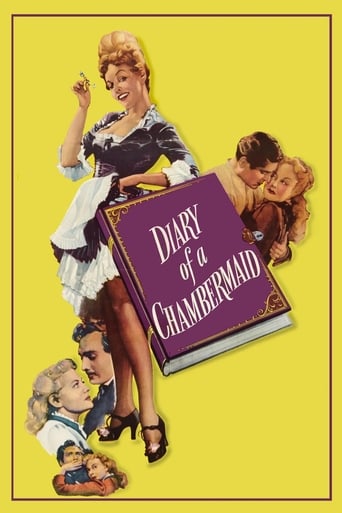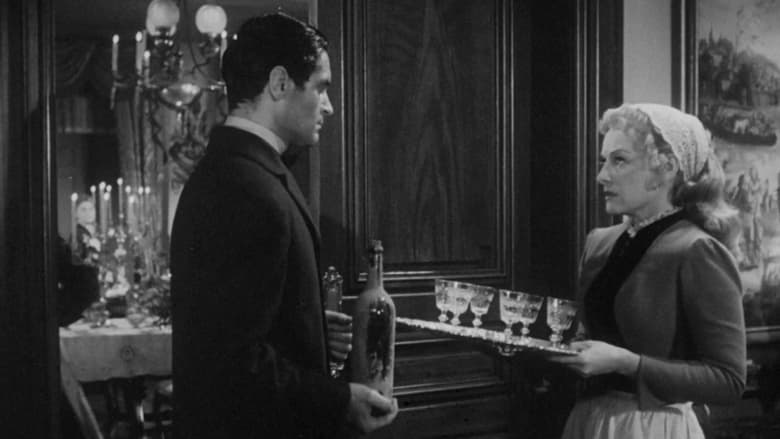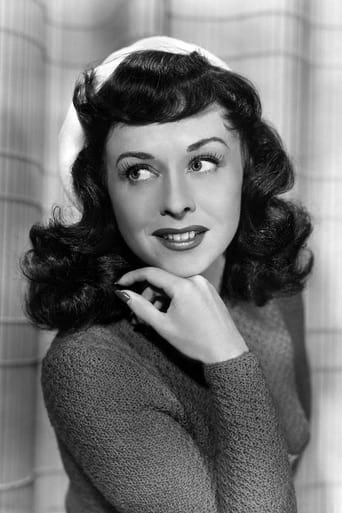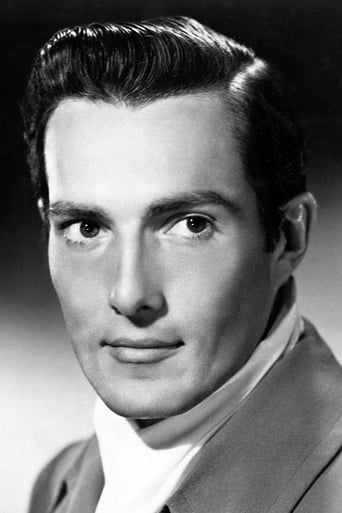

The Diary of a Chambermaid (1946)
Celestine, the chamber-maid, has a new job in the country, at the Lanlaires. She has decided to use her beauty to seduce a wealthy man, but Mr. Lanlaire is not a right choice: the house is firmly controlled by Madame Lanlaire, helped by the strange valet Joseph. Then she tries the neighbour, former officer Mauger. This seems to work. But soon the son of the Lanlaires comes back. He is young, attractive and does not share his mother's antirepublican opinions. So Celestine's beauty attracts Captain Mauger, young Georges Lanlaire, and Joseph. Three men, from three different social classes, with three different conceptions of life. Will Celestine be able to convince Georges of her sincerity?
Watch Trailer
Cast


Reviews
Like the great film, it's made with a great deal of visible affection both in front of and behind the camera.
This movie tries so hard to be funny, yet it falls flat every time. Just another example of recycled ideas repackaged with women in an attempt to appeal to a certain audience.
The movie turns out to be a little better than the average. Starting from a romantic formula often seen in the cinema, it ends in the most predictable (and somewhat bland) way.
The film's masterful storytelling did its job. The message was clear. No need to overdo.
The Diary of a Chambermaid is a transitional film in the development of Renoir's lesser known stylistic system. Braudy would later distinguish Renoir's two systems as being tied to theater and realism respectively (although there have been compelling arguments about these categories being either reductive or simply misnomers). Goddard is the focus of the story (much in the same way Renoir later uses Magnani, Arnoul and Bergman). The camera tracks her action, her closeups are one-shot, there are alternating shot scales in single scenes to emphasize her character's psychological reaction to events, studio exteriors help idealize the framing of her screen personality and high/low angle shots purvey her psychological perspective on group dynamics. Celestine (Goddard) has an ambiguity to her motivation that heightens psychological identification. It is unclear as to whether she sees the world divided into classes or sexes, or both. The ending is a happy one, and the politics is further subverted through jovial and emotionally-charged highly-individualized characters. Non-diegetic soundtrack is employed to increase distinctions in the emotional responses of different characters. Depth of field is at the service of Celestine's staging while obstructions in the mise-en-scene become incorporated into the plot. In this respect, the camera is not an unobtrusive one. There is an inconsistency in the use of stylistics, where on one hand reframing pans are fully at the service of psychological identification and privilege of the transcendental subject position while the long take mobile framing of the July 14th celebration reminisce on M.Lange, Illusion and Regle. Diary is a melodrama with comedic elements to take the edges off, but when the master of the house reads in the morning paper "another woman murdered in Paris, another woman cut to pieces" there is no doubt that Renoir is infusing a consideration for the plight of women in a misogynist society. This was very important to him and perhaps the dark undertones of this film have something to say about the repression he experienced working in Hollywood for the war. How Burgess Meredith factors into all that remains to be seen.
I have seen a french movie "Journal d'une Femme de chambre" by Luis Bunuel...It seems that Remoir just regurgitated this movie...I saw "La Règle du Jeu"...and was not at all impressed...Renoir is very over-rated...In fact Bunuel's movie has same plot...beautiful chambermaid goes to country and everybody is impressed by her charm...his master tries to seduce her...the neighbor flirts with her...the head-servant likes her but ridicules her all the time...we see the movie through her eyes...she does seduce somebody but thats not for money...in a sense that seduction is for greater good...furthermore Bunuel's movie has a very strong political message apart from being a commentary on french bourgeois habitudes...It is very powerful extreme left propaganda movie...Jeanne Moreau of course is subliminal as usual...Renoir sucks...
Paulette Godard has never been more than the faintest blip on my personal radar but that, of course, may be my problem rather than hers. Her particular allure and/or charm has always eluded me and I've never accused her of being anything more than competent in the Acting department. That out of the way I have to say she makes a reasonable fist out of Celestine, the gold-digging chambermaid who fetches up in one of those eccentric households that are the backbone of Fiction, Theatre and Silver Screen. In something of a twist on a prevailing trend expatriate Jean Renoir opted to shoot a French story in Hollywood though he would, of course, also shoot American subjects there along with Max Ophuls who clearly became infected with the same bug as Renoir and made Letter From An Unknown Woman there two years later. The semi-classic novel which had also been dramatised for the stage was given a new lick of paint by actor Burgess Meredith - married to Godard at the time - who, as Producer, cast himself as the elderly Captain rather than the love interest, no doubt in an effort to display another of the strings on his bow. It's a strange melange and the presence of Judith Anderson should be sufficient to alert the cognoscenti to the tone - this time around she encourages a servant to seduce her son - and overall this is a movie that needs to be viewed more than once in order to formulate a balanced opinion.
I cannot pretend to explain all the allusions and metaphors Renoir intended to convey with this impressionistic comedy. Paulette Goddard, as the main character, is magnificent. She conveys her feelings and thoughts through her diary, but in a manner that is always blurry and full of confusion. And speaking of confusion, Hurd Hatfield is on hand as the scion of the odd home. Burgess Meredith, Francis Lederer, and Irene Ryan all add terrific seriocomic support in their roles.Be prepared to experience many conflicting feelings while viewing this film.




